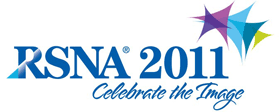
Abstract Archives of the RSNA, 2011
Ji-Mi Huh, Presenter: Nothing to Disclose
Jee Eun Lee MD, Abstract Co-Author: Nothing to Disclose
Eun Suk Cha, Abstract Co-Author: Nothing to Disclose
Sung Shine Shim, Abstract Co-Author: Nothing to Disclose
Seung Yon Baek MD, Abstract Co-Author: Nothing to Disclose
This study was performed to evaluate the imaging features of bilateral synchronous breast cancer.
From April 2009 to March 2011, 25 patients presented bilateral synchronous breast malignancies at our institution. Five patients, for which preoperative MRI or BSGI was not available, were excluded, and the remaining 20 patients (aged 36-81years, mean 49years old) made up the material for the evaluation of the imaging findings. All 20 patients had undergone mammography, ultrasonography, MRI and BSGI.
On mammography, 18 of 20 index cancers were seen as mass or microcalcifications. Two index cancers were not visible on mammography due to post-excisional state. Three of 20 contralateral cancers were not visible on mammography, and the remaining contralateral cancers were seen as mass or microcalcifications. Thirty-nine cancers were visible on ultrasonography. One contralateral cancer was not identified on US, which was seen as microcalcifications on mammography. Two of 19 contralateral cancers were identified on 2nd look ultrasonography after MRI examination. All cancers were visible on MRI, except 1 contralateral cancer. One contralateral cancer was seen as microcalcifications on mammography. On BSGI, 14 of 20 patients showed bilateral focal radiotracer uptake. BSGI identified index cancer only in 5 of 20 patients and contralateral cancer only in 1 of 20 patients.
Bilateral synchronous breast cancers were more accurately detected on ultrasonography and MRI. Ultrasonography and MRI will be helpful for early detection of the contralateral cancer of bilateral synchronous breast cancer.
Ultrasonography and MRI will be helpful for early detection of the contralateral cancer of bilateral synchronous breast cancer.
Huh, J,
Lee, J,
Cha, E,
Shim, S,
Baek, S,
Imaging Findings of Bilateral Synchronous Breast Cancer: Mammography, Ultrasonography, MRI, and Breast-specific Gamma Imaging. Radiological Society of North America 2011 Scientific Assembly and Annual Meeting, November 26 - December 2, 2011 ,Chicago IL.
http://archive.rsna.org/2011/11015383.html

